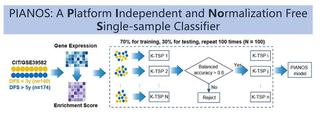PIANOS
 The construction of PIANOS
The construction of PIANOSOverview
Current prognostic biomarkers for colorectal cancer (CRC) often lack stability and generalizability across different patient cohorts and technological platforms, presenting a significant challenge for precise patient stratification and personalized treatment. Many existing molecular-based risk prediction models require stringent platform-specific data handling, complex normalization procedures, and precise quantitative measurements, limiting their practical application in diverse clinical settings.
This study introduces PIANOS (Platform Independent And Normalization-free Single-sample Classifier), a novel system designed to overcome these limitations. PIANOS aims to accurately categorize patients with CRC into distinct risk groups to refine treatment decisions. Developed using gene expression data from 562 patients, it employs a rank-based k-Top Scoring Pairs (k-TSP) algorithm alongside resampling techniques. A key innovation of PIANOS is its ability to provide robust risk stratification for individual patients without the need for cohort-wide normalization or platform-specific calibration.
PIANOS was rigorously validated in 15 independent cohorts, encompassing 3666 patients with CRC, where it consistently and effectively differentiated high-risk from low-risk patients. Notably, it demonstrated superior performance compared to 105 existing prognostic models and showed robust accuracy across various technologies, including microarrays and RNA sequencing. PIANOS-based stratification was validated as an independent predictor of disease-free survival. Furthermore, the model successfully discriminated treatment responses across risk categories, indicating that high-risk patients may derive more benefit from bevacizumab, while low-risk patients may show enhanced responsiveness to chemotherapy and immunotherapy.
This research offers a significant advancement in supporting clinical decision-making for CRC by providing a reliable and broadly applicable framework for optimizing patient treatment strategies, paving the way for more effective personalized medicine.